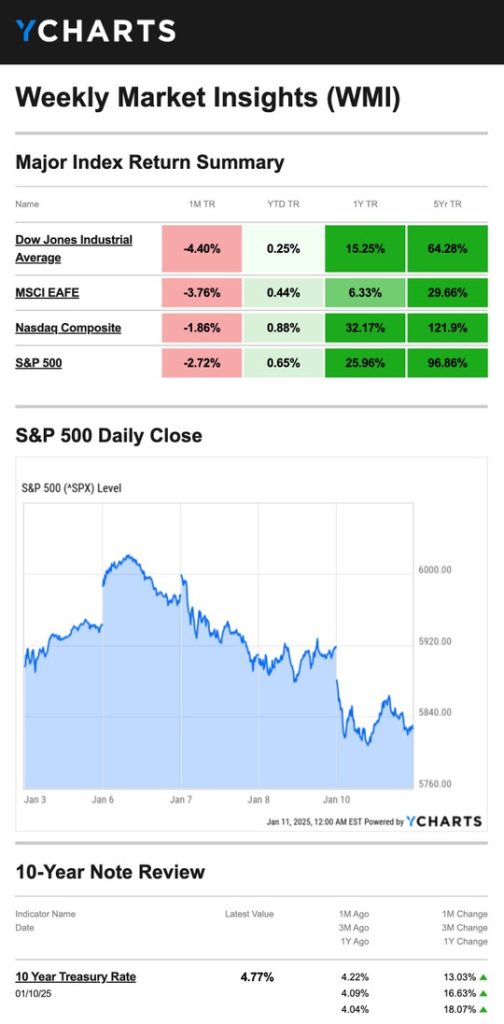By Gerry Sparrow
Stocks fell for the second consecutive week as a round of fresh economic data stoked inflationary fears among investors.
The Standard & Poor’s 500 Index declined 1.94 percent, while the Nasdaq Composite Index dropped 2.34 percent. The Dow Jones Industrial Average lost 1.86 percent. The MSCI EAFE Index, which tracks developed overseas stock markets, slipped 0.49 percent.1,2
Inflation Stymies Markets
Stocks rallied broadly to start the week, but two economic reports on Tuesday—job openings and the prices-paid index among service companies—raised fresh inflation concerns. Higher Treasury yields also put pressure on stocks.3,4
Stocks flattened out on Wednesday. Investors reacted to news that most Federal Open Market Committee members agreed inflation risks had increased, per minutes from the Fed’s December meeting.5,6
U.S. stock markets were closed Thursday in observance of President Jimmy Carter’s funeral.
On Friday, a warmer-than-expected December jobs report caused investors to question whether the Fed will adjust rates in 2025. News that consumer sentiment ticked down also pushed stocks lower.7

Source: YCharts.com, January 11, 2025. Weekly performance is measured from Friday, January 3, to Friday, January 10. TR = total return for the index, which includes any dividends as well as any other cash distributions during the period. Treasury note yield is expressed in basis points.
When Good Becomes Bad News
The economy added 256,000 jobs in December—100,000 more than economists expected. That’s the second-highest monthly job gain for 2024. Unemployment ticked down to 4.1 percent, which was also better than anticipated.
Job growth and lower unemployment signals good news for the economy but bad news for the markets. A stronger jobs market puts less pressure on the Fed to adjust rates, especially with inflation top-of-mind among investors.8,9
This Week: Key Economic Data
Monday: Treasury Statement.
Tuesday: Producer Price Index. Fed officials Jeffrey Schmid and John Williams speak.
Wednesday: Consumer Price Index. Fed officials Thomas Barkin, Neel Kashkari, John Williams, and Austan Goolsbee speak. Fed Beige Book.
Thursday: Retail Sales. Import and Export Prices. Business Inventories. Homebuilder Confidence Index.
Friday: Housing Starts and Permits. Industrial Production.
Source: Investors Business Daily – Econoday economic calendar; January 9, 2025
The Econoday economic calendar lists upcoming U.S. economic data releases (including key economic indicators), Federal Reserve policy meetings, and speaking engagements of Federal Reserve officials. The content is developed from sources believed to be providing accurate information. The forecasts or forward-looking statements are based on assumptions and may not materialize. The forecasts also are subject to revision.
Originally posted on January 16, 2025
Footnotes and Sources
1. The Wall Street Journal, January 10, 2025
2. Investing.com, January 10, 2025
3. CNBC.com, January 6, 2025
4. The Wall Street Journal, January 7, 2025
5. CNBC.com, January 8, 2025
6. MarketWatch.com, January 8, 2025
7. CNBC.com, January 10, 2025
8. The Wall Street Journal, January 10, 2025
9. TradingEconomics.com, January 10, 2025
PHOTO CREDIT: https://www.shutterstock.com/g/fizkes
VIA SHUTTERSTOCK
DISCLOSURES:
Investing involves risks, and investment decisions should be based on your own goals, time horizon, and tolerance for risk. The return and principal value of investments will fluctuate as market conditions change. When sold, investments may be worth more or less than their original cost.
The forecasts or forward-looking statements are based on assumptions, may not materialize, and are subject to revision without notice.
The market indexes discussed are unmanaged, and generally, considered representative of their respective markets. Index performance is not indicative of the past performance of a particular investment. Indexes do not incur management fees, costs, and expenses. Individuals cannot directly invest in unmanaged indexes. Past performance does not guarantee future results.
The Dow Jones Industrial Average is an unmanaged index that is generally considered representative of large-capitalization companies on the U.S. stock market. Nasdaq Composite is an index of the common stocks and similar securities listed on the NASDAQ stock market and is considered a broad indicator of the performance of technology and growth companies. The MSCI EAFE Index was created by Morgan Stanley Capital International (MSCI) and serves as a benchmark of the performance of major international equity markets, as represented by 21 major MSCI indexes from Europe, Australia, and Southeast Asia. The S&P 500 Composite Index is an unmanaged group of securities that are considered to be representative of the stock market in general.
U.S. Treasury Notes are guaranteed by the federal government as to the timely payment of principal and interest. However, if you sell a Treasury Note prior to maturity, it may be worth more or less than the original price paid. Fixed income investments are subject to various risks including changes in interest rates, credit quality, inflation risk, market valuations, prepayments, corporate events, tax ramifications and other factors.
International investments carry additional risks, which include differences in financial reporting standards, currency exchange rates, political risks unique to a specific country, foreign taxes and regulations, and the potential for illiquid markets. These factors may result in greater share price volatility.
Please consult your financial professional for additional information.
This content is developed from sources believed to be providing accurate information. The information in this material is not intended as tax or legal advice. Please consult legal or tax professionals for specific information regarding your individual situation. This material was developed and produced by FMG Suite to provide information on a topic that may be of interest. FMG is not affiliated with the named representative, financial professional, Registered Investment Advisor, Broker-Dealer, nor state- or SEC-registered investment advisory firm. The opinions expressed and material provided are for general information, and they should not be considered a solicitation for the purchase or sale of any security.




